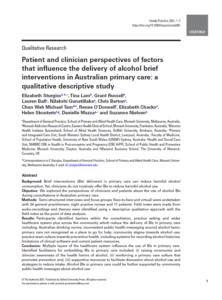 This paper on patient and clinician perspectives on what influences the delivery of alcohol brief interventions in the Australian primary care context was published in Family Practice. [PDF : Link]
This paper on patient and clinician perspectives on what influences the delivery of alcohol brief interventions in the Australian primary care context was published in Family Practice. [PDF : Link]
Sturgiss E, Lam T, Russell G, Ball L, Gunatillaka N, Barton C, Tam CWM, O’Donnell R, Chacko E, Skouteris H, Mazza D, Nielsen S. Patient and clinician perspectives of factors that influence the delivery of alcohol brief interventions in Australian primary care: a qualitative descriptive study. Family Practice. 2021. DOI: 10.1093/fampra/cmab091
Abstract
Background
Brief interventions (BIs) delivered in primary care can reduce harmful alcohol consumption. Yet, clinicians do not routinely offer BIs to reduce harmful alcohol use.
Objective
We explored the perspectives of clinicians and patients about the use of alcohol BIs during consultations in Australian primary care.
Methods
Semi-structured interviews and focus groups (face-to-face and virtual) were undertaken with 34 general practitioners, eight practice nurses and 17 patients. Field notes were made from audio-recordings and themes were identified using a descriptive qualitative approach with the field notes as the point of data analysis.
Results
Participants identified barriers within the consultation, practice setting and wider healthcare system plus across the community which reduce the delivery of BIs in primary care including: Australian drinking norms; inconsistent public health messaging around alcohol harm; primary care not recognized as a place to go for help; community stigma towards alcohol use; practice team culture towards preventive health, including systems for recording alcohol histories; limitations of clinical software and current patient resources.
Conclusion
Multiple layers of the healthcare system influence the use of BIs in primary care. Identified facilitators for embedding BIs in primary care included: (i) raising community and clinician awareness of the health harms of alcohol, (ii) reinforcing a primary care culture that promotes prevention and, (iii) supportive resources to facilitate discussion about alcohol use and strategies to reduce intake. Alcohol BIs in primary care could be further supported by community public health messages about alcohol use.
